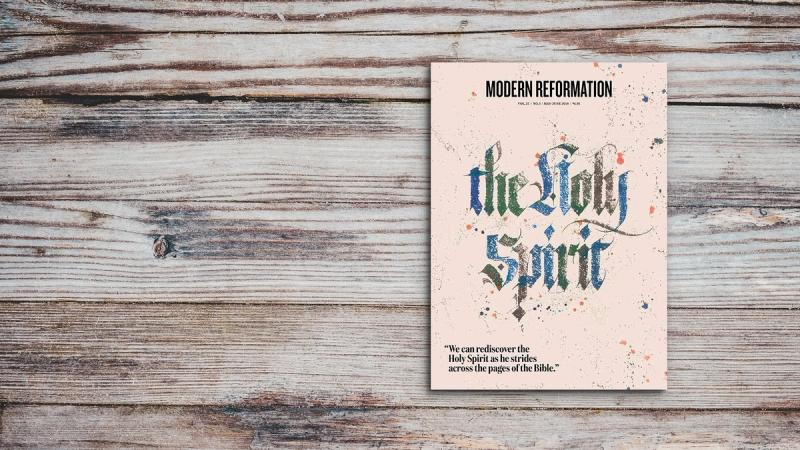What I like most about Stephen Wolfe’s proposal above is that it comes in sheep’s clothing. Seriously. Allow me to say how grateful I am to be having this conversation and to be reading fresh, new, and creative engagement on a well-worn topic. This is saying a lot when you address a debate where the battle lines have been dug so deeply.
“Speaking makes writing easier, and writing makes speaking more precise.” I have always taken Quintilian’s famous dictum as advice to writers: When you get stuck with the pen, try talking about your topic to a friend. It works! But the great rhetorician’s advice is equally applicable to the value of dialogue to productive thought. Constructive conversation between neo-Calvinists and two-kingdom advocates is rare. All too often we write past one another, when speaking could facilitate greater understanding and clarity in our printed exchanges.
I do regret that this exchange is in print. Verbal dialogue is best, and no doubt my response would have been improved by a conversation or two. But I rejoice that Wolfe and Modern Reformation have initiated an engagement and exchange of ideas, and I pray I can hold up my end of the bargain.
Wolfe is also to be commended for reminding us how much both sides really have in common. Leave it to a bunch of Calvinists to focus on what little divides us. But both sides in this discussion believe in the transformative power of the gospel. Both sides recognize that the coming of the king changes everything, and both sides believe in the antithesis between the kingdom of Christ and the kingdoms of this world. As is often the case, many partisans have exaggerated the differences. In short, we need more beer summits and fewer Beer Hall Putsches! But Wolfe has also succeeded in identifying some differences, to which we must now turn.
Christian Adornment
My fundamental concern with Wolfe’s proposal is his clear statement in his title and conclusion that the Christian life is an adornment. It is not; it is new creation.
When I first read Wolfe’s essay, I confess to being a bit lost. As with all “third-way” proposals that seek to mediate two disparate views, his reshuffled the deck, and I found it a bit difficult to track with the details. Thus I found it helpful to step back from the trees and consider what sort of forest I was looking at. Wolfe helpfully has made his basic, overarching theme as clear as day in both his title and conclusion: “Christianity as Civil Society’s Adornment.”
While you may be reading this in the summer, I am writing these words in the season of Advent, looking at my family’s Christmas Tree. I love the holiday ritual of decorating the Tree (capitalized here to show my devotion to this pagan rite). I made some of the ornaments by hand as a child, and my daughter made some others. In our house, every year’s Tree is the most beautiful Tree ever.
I love decorating the Christmas Tree. And yet, I don’t think ornamentation—“adornment”—is a fitting metaphor for the Christian life. I struggle to see how adornment sufficiently captures how the gospel makes all things new. The Christian life is not tinsel. It is new creation. I do not mean to belittle Wolfe’s proposal by calling it tinsel—far from it. I believe I am taking his words seriously—words carefully chosen and deployed at the most crucial points of his essay. Furthermore, I think this characterization is backed up by the details.
Wolfe repeatedly uses “adorn” and “adorning,” and he speaks of “accidental features of civil society,” “customs and traditions,” and “variety of ornamentation and design.” The following sentences capture this idea and show that I’m not cherry-picking:
Neither the civil recognition of Christ as king, nor the adorning of civil society with Christian features, spiritualizes the civil realm. The essence of natural civil order remains unaltered. Only the accidental features have been transformed.
The language of substance and accidents is well established in philosophical and theological thought. To call something “accidental” is to identify it as incidental, unnecessary, or nonessential. It also implies something is the product of chance or unintentional. I can’t fathom how, given the fullness of the revelation of Christ, we could describe his coming kingdom or any aspects of it in these terms. His is the blood of the eternal—not accidental—covenant.
Now, I am sure Wolfe did not intend his proposal to speak disparagingly of Christ or his kingdom. I am certain he did not mean to imply that the in-breaking of the kingdom of Christ in the life of the believer produces anything but lasting fruit. He was, I trust, seeking another advantage by employing this metaphor—to gain a sense of how the eternal and the temporal expressed themselves in the present age, how the “not yet” became a part of our “already.” In short, he is proposing an accidental or secondary use of Christianity in the civil sphere.
And yet, the upshot of this proposal seems to me to be not just wrong but 180 degrees wrong. In attempting to synthesize two divergent views, he has managed to lose something we both hold dear: the antithesis between this kingdom of God and the kingdoms of this world. He takes something essential and eternal and turns it into something accidental and temporary. This may seem to be a blunt evaluation of Wolfe’s proposal, but I hope that in putting this in the starkest terms, he may be able to reformulate it in a manner more faithful to the New Testament claims of new creation.
A Few Devils in the Details
I confessed earlier to getting lost in the details of Wolfe’s essay. That assessment would be uncharitable if I didn’t at least identify some of the details I found confusing. I regret that space doesn’t allow me to more fully engage in these specifics. What follows, in no particular order, is a rundown of details that this reader believes need greater clarification to open the door to more fruitful dialogue.
(1) Wolfe characterizes the two-kingdom position, typified by Darryl Hart, as “other-worldly and worship focused.” This is a recurring criticism among two-kingdom opponents, and I think it fundamentally misconstrues the two-kingdom position. As I read Hart and other proponents of the view, “churchly” is a far better descriptor of the position, and the activity and power of the church is very much of this world. Gospel ministry—this worldly word and sacrament—and diaconal care really transform flesh and blood sinners. The new creation and resurrection life really break in to the here and now. If Wolfe grants this, the question then becomes, what kind of change does the gospel effect in this world, and how?—instead of, does the gospel effect change in this world or the next?
(2) Wolfe posits a fundamental distinction between the “immutable natural order” and more variable social and political structures of society. This substitutes “nature” for the more traditional (and biblical) understanding of “natural revelation.” For instance, Wolfe writes, “The principles of the civil order are dictated by nature.” Does Wolfe perhaps mean to say that they are dictated by God, via natural revelation? This is an important distinction. Principles drawn from nature aren’t immutable, in the sense of existing prior to God, and the perception of them is not unscathed by the effects of sin nor immune to the regenerating power of new life.
(3) Wolfe is correct that the Reformed tradition has a “somewhat positive view on unregenerate civil righteousness,” but his language here lacks precision. David VanDrunen has shown that the Reformed tradition carefully defined natural law and precisely qualified its utility in life and doctrine. Indeed, this precision is the hallmark of the Reformed tradition’s use of natural law, and one of the genuine advances on this topic brought about in the sixteenth and seventeenth centuries. By speaking imprecisely and abandoning careful qualifications, Wolfe runs the risk of falling into the same errors of pre-Reformation thought on natural law.
(4) Wolfe’s use of “conversion” is unclear to me. What would it mean for a pagan kingdom to be converted to Christianity? Is it a matter of majority rule and getting to 51 percent of the population? This is not the complete and total change of allegiance we usually mean when we discuss personal conversion. Similarly, what would it mean to become a “Christian family”? I affirm that God’s way of salvation is covenantal and works through the natural order of the family unit and parental headship. But if a single adult child converts, are his siblings and elderly parents now part of a “Christian family”? Do you need a majority? Wolfe maintains that Christianity perfects this family, but it is a “relative perfection.” Again, the antithesis between Christianity and the world is minimized.
(5) I don’t understand how superficial elements of Christianity can provide any meaningful “solidarity and sense of belonging” for a civil community. Christianity is a faith; it is meaningfully understood only when it is personally confessed, with lips and heart. It can provide solidarity and belonging only within a community whose members universally confess it—that is, within the church. This unity, within the church, is the only unity the New Testament knows. In fact, the church is promised the opposite of “solidarity” with the world—namely, separation and alienation from the world and persecution at its hands. To take one of Wolfe’s examples—Sabbath laws—what does preventing a pagan from buying a fifth of Jack Daniels on the Lord’s Day have to do with the fourth commandment? For believers, the fourth commandment is about creating space in our mundane lives for worship and experiencing a foretaste of our heavenly rest.
I admit this is a hodgepodge of concerns, but there are real devils in these details. I may have misconstrued some of these elements of Wolfe’s proposal; but their number and diversity, I fear, is an occupational hazard of Wolfe’s attempt at a synthesis of distinct views. By attempting to borrow from the best of both worlds, he has muddied some clear distinctions developed by each. In short, his novel approach suffers from its novelty, and I hope and pray this interaction may help him to further clarify it, so he can continue his interaction with the Reformed tradition.
The Tree of Life
The relation of Christianity to culture is an elusive topic, and the church’s wrestling with it is ever changing precisely because it must always reflect the unique context of its particular moment. Stephen Wolfe is to be commended because he has attempted to wrestle with it in a fresh and different way. We should not be surprised that he encounters some difficulties.
However, there is one factor that both sides in the neo-Calvinist/two-kingdom debate affirm: Christianity is not merely an adornment to civil society, nor can it be used as such without fundamentally altering its essence. To return to my Christmas metaphor, Christianity is not an ornament, it isn’t tinsel. It is the Tree. As we see in the classic seventeenth-century English carol, “Jesus Christ the Apple Tree”:
The tree of life my soul hath seen Laden with fruit and always green The trees of nature fruitless be Compared with Christ the apple tree His beauty doth all things excel By faith I know but ne’er can tell The glory which I now can see In Jesus Christ the apple tree. Christianity—Christ—is not adornment. Christ is the Tree.
Continue to Part 3: In Defense of Cultural Christianity, A response to Brian Lee by Stephen Wolfe






